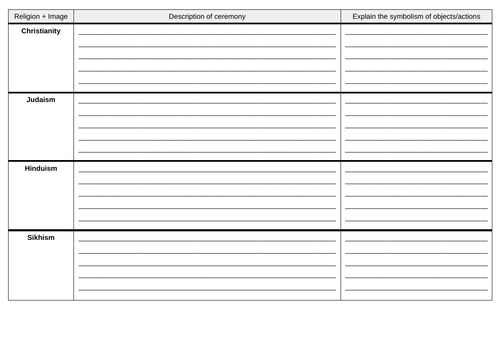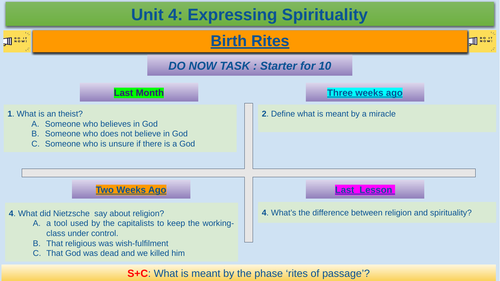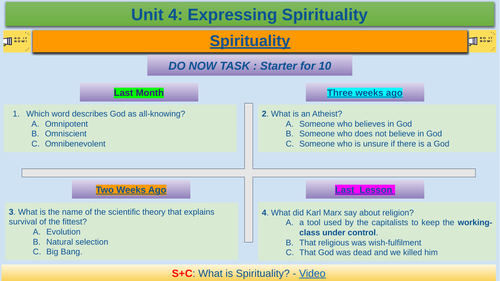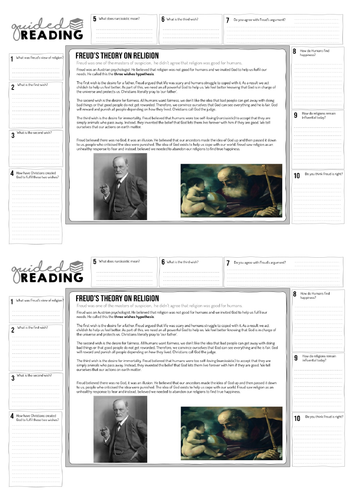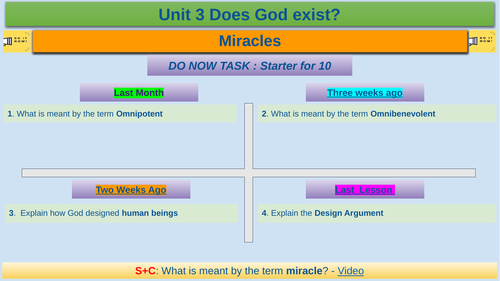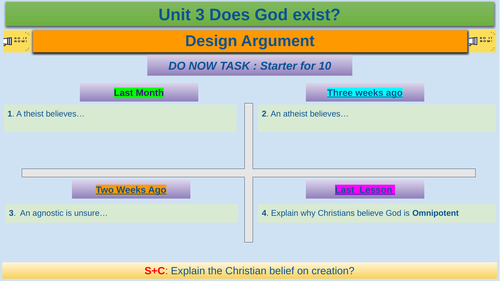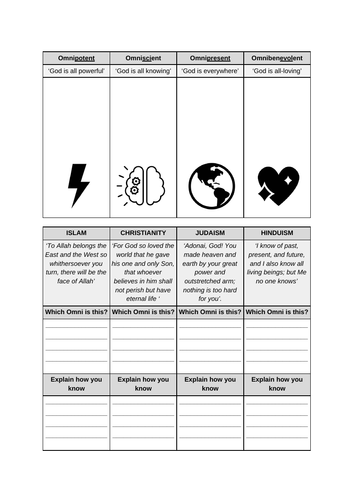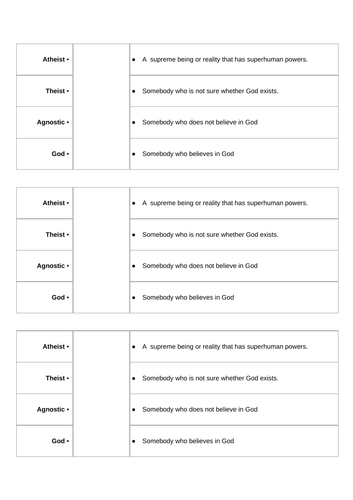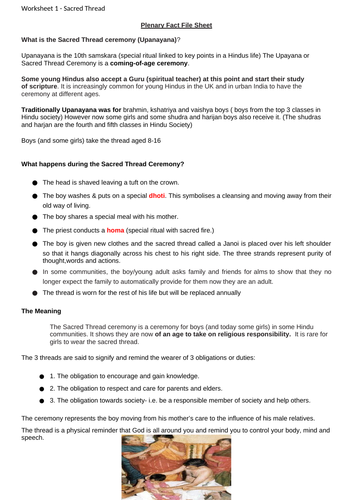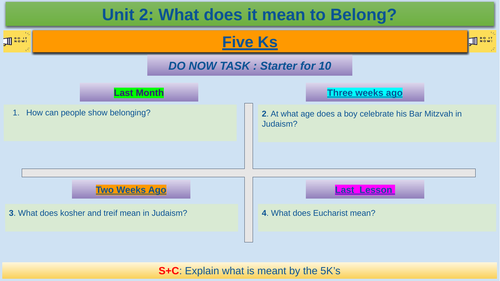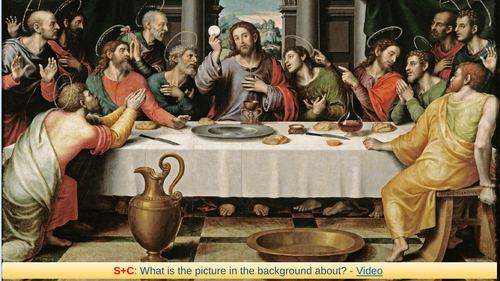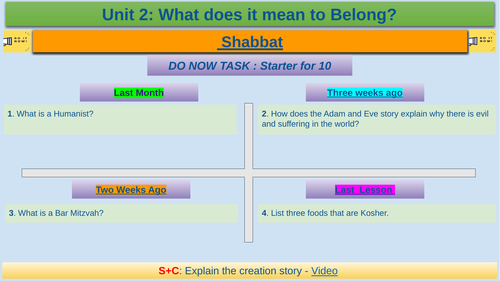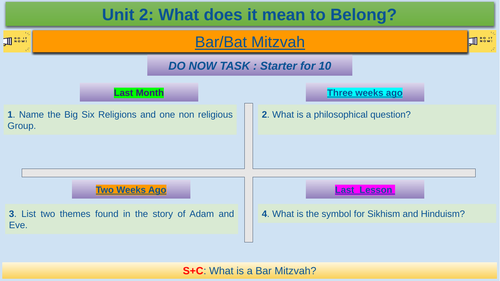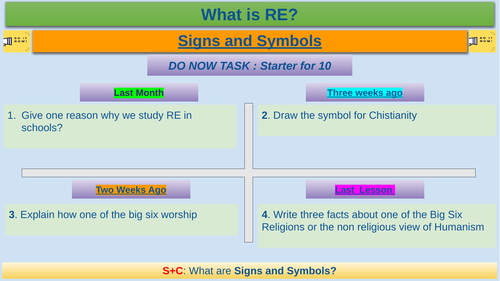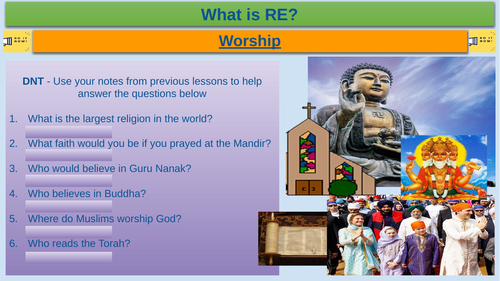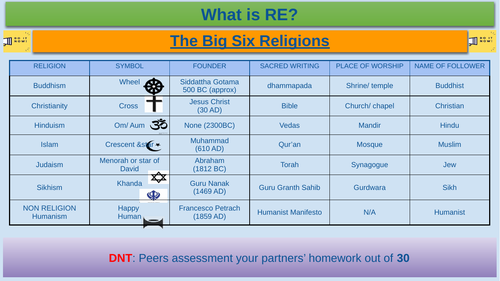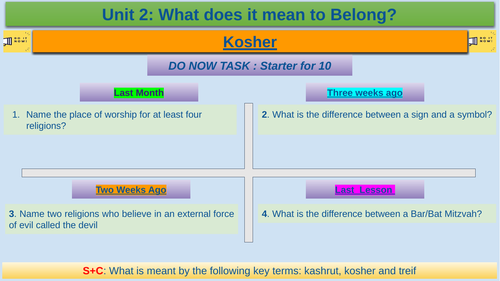
221Uploads
34k+Views
7k+Downloads
Religious education

Coming of Age Ceremony
KS3 Philosophy and Ethics - Unit 4 Expressing Spirituality: What makes a journey special?
Students will be able to:
To describe what happens at a Coming of Age Ceremony
To explain why these ceremonies are important
To analyse how Coming of Age Ceremonies provide a sense of belonging
Feedback is welcome, please check out the rest of my lessons in the Science and Religion Scheme of Work!

Birth Rites
KS3 Philosophy and Ethics - Unit 4 Expressing Spirituality: What makes a journey special?
Students will be able to:
To describe what happens at a birth rites
To explain why birth rites are important
To analyse how birth rites provide a sense of belonging
Feedback is welcome, please check out the rest of my lessons in the Science and Religion Scheme of Work!

Spirituality
KS3 Philosophy and Ethics - Unit 4 Expressing Spirituality: What makes a journey special?
Students will be able to:
To describe what is meant by spirituality
To explain how people may show spirituality
To consider the difference between being spiritual and being religious.
Feedback is welcome, please check out the rest of my lessons in the Science and Religion Scheme of Work!

Psychologists viewpoint on God
KS3 Philosophy and Ethics - Unit 3 Does God exist?
Students will be able to:
To explore the background of three mainstream psychologists
To explain how some Psychologists view God
To evaluate the psychologists viewpoint on God
Feedback is welcome, please check out the rest of my lessons in the Science and Religion Scheme of Work!

Miracles
KS3 Philosophy and Ethics - Unit 3 Does God exist?
Students will be able to:
To describe the different understanding of the word miracle
To explain the arguments for and against miracles
To evaluate whether miracles prove the existence of God
Feedback is welcome, please check out the rest of my lessons in the Science and Religion Scheme of Work!

Design Argument
KS3 Philosophy and Ethics - Unit 3 Does God exist?
Students will be able to:
To Identify the Christian beliefs on creation
To explain how Christians justify their beliefs on creation
To evaluate religious and scientific beliefs on creation
Feedback is welcome, please check out the rest of my lessons in the Science and Religion Scheme of Work!

Nature of God
KS3 Philosophy and Ethics - Unit 3 Does God exist?
Students will be able to:
To describe the following keywords; omnipotent, omniscient, omnipresent
To explain and justify the nature of God
To evaluate the nature of God
Feedback is welcome, please check out the rest of my lessons in the Science and Religion Scheme of Work!

Does God exist?
KS3 Philosophy and Ethics - Unit 3 Does God exist?
Students will be able to:
To identify the words, Theist, Agnostic, Atheist
To explain why people may hold Theist, Agnostic or Atheistic beliefs
To explore how these beliefs may affect people’s view on the purpose of life
Feedback is welcome, please check out the rest of my lessons in the Science and Religion Scheme of Work!

Sacred Thread Ceremony
KS3 Philosophy and Ethics - Unit 2: What does it mean to Belong?
Students will be able to:
To identify what happens during the sacred thread ceremony
To explain the responsibilities a Hindu boy takes on after the sacred thread ceremony
To analyse the benefits of the sacred thread ceremony for all Hindus
Feedback is welcome, please check out the rest of my lessons in the Science and Religion Scheme of Work!

Five Ks
KS3 Philosophy and Ethics - Unit 2: What does it mean to Belong?
Students will be able to:
To identify the 5K’s of Sikhism
To explain the significance of the 5K’s to a Sikh
To evaluate whether people should be able to express religious identity and belonging
Feedback is welcome, please check out the rest of my lessons in the Science and Religion Scheme of Work!

Eucharist
KS3 Philosophy and Ethics - Unit 2: What does it mean to Belong?
Students will be able to:
To identify what is meant by the Eucharist
To explain its importance to Christians
To evaluate different beliefs about the Eucharist
Feedback is welcome, please check out the rest of my lessons in the Science and Religion Scheme of Work!

Shabbat
KS3 Philosophy and Ethics - Lesson 1 of Unit 1 - What is RE? SoW.
Students will be able to:
To identify what is meant by Shabbat
To explain why and how Jews celebrate Shabbat
To evaluate whether Shabbat is still important for Jews in Britain today
Feedback is welcome, please check out the rest of my lessons in the Science and Religion Scheme of Work!

Bar_Bat Mitzvah
KS3 Philosophy and Ethics - Unit 2: What does it mean to Belong?
Students will be able to:
To identify when a child becomes an adult in the Jewish community
To examine the key features of a Bar/Bat Mitzvah
To analyse the impact of a Bar/Bat Mitzvah on the Jewish community
Feedback is welcome, please check out the rest of my lessons in the Science and Religion Scheme of Work!

Signs and Symbols
KS3 Philosophy and Ethics - Unit 1 - What is RE? SoW.
Students will be able to:
To identify what is meant by a sign and symbol
To explain the difference between a sign and a symbol
To examine the meaning of at least one religious and secular symbol
Feedback is welcome, please check out the rest of my lessons in the Science and Religion Scheme of Work!

Worship
KS3 Philosophy and Ethics - Unit 1 - What is RE? SoW.
Students will be able to:
To describe what is meant by worship
To identify where and how religious people worship
To examine interesting facts about each of the big six religions
Feedback is welcome, please check out the rest of my lessons in the Science and Religion Scheme of Work!

The Big Six Religions
KS3 Philosophy and Ethics - Unit 1 - What is RE? SoW.
Students will be able to:
To describe key knowledge on the big six religions
To examine the key artifacts of the big six religions
To explore the origins of the big six religions
Feedback is welcome, please check out the rest of my lessons in the Science and Religion Scheme of Work!

Kosher
KS3 Philosophy and Ethics - Unit 1 - What is RE? SoW.
Students will be able to:
To identify the meaning of the key words: kashrut, kosher and treif.
To examine what foods orthodox (strict ) Jews can eat and what foods they cannot.
To analyse why religious Jews follow the Jewish food laws
Feedback is welcome, please check out the rest of my lessons in the Science and Religion Scheme of Work!

Religious attitudes to Fogiveness - AQA - Religious Studies GCSE
Resource includes PowerPoint presention and differentiated worksheets for a 1 hour lesson, following the AQA specification.
Component 2: Thematic studies
Theme E
L1 - Good and Evil Intentions
L2 - Different types of crime
L3 - Reasons for Crime - Part 1
L4 - Reasons for Crime - Part 2
L5 - Aims of Punishment
L6 - Types of Punishment
L7 - Religious attitudes towards Types of Punishment
L8 - Religious attitudes to Fogiveness

Religious attitudes towards Types of Punishment - AQA - Religious Studies GCSE
Resource includes PowerPoint presention and differentiated worksheets for a 1 hour lesson, following the AQA specification.
Component 2: Thematic studies
Theme E
L1 - Good and Evil Intentions
L2 - Different types of crime
L3 - Reasons for Crime - Part 1
L4 - Reasons for Crime - Part 2
L5 - Aims of Punishment
L6 - Types of Punishment
L7 - Religious attitudes towards Types of Punishment
L8 - Religious attitudes to Fogiveness

Types of Punishment - AQA - Religious Studies GCSE
Resource includes PowerPoint presention and differentiated worksheets for a 1 hour lesson, following the AQA specification.
Component 2: Thematic studies
Theme E
L1 - Good and Evil Intentions
L2 - Different types of crime
L3 - Reasons for Crime - Part 1
L4 - Reasons for Crime - Part 2
L5 - Aims of Punishment
L6 - Types of Punishment
L7 - Religious attitudes towards Types of Punishment
L8 - Religious attitudes to Fogiveness

